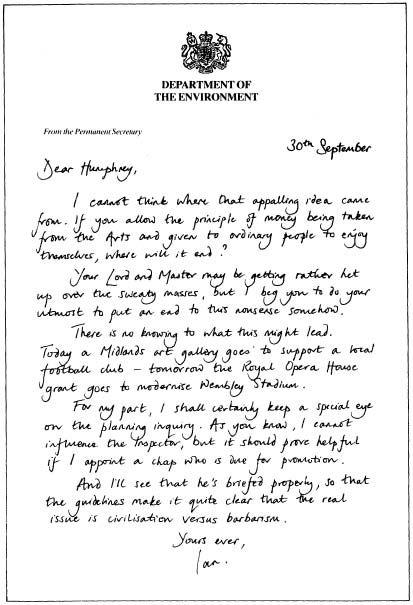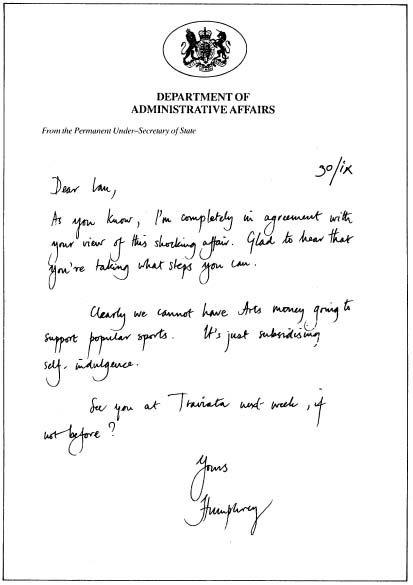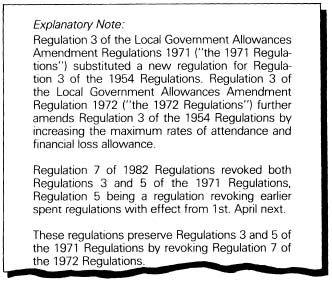The Complete Yes Minister (72 page)

‘The Royal Opera House,’ I explained, ‘gets about nine and a half million pounds a year of public money. For what? The public can’t afford to buy thirty- or forty-quid seats for gala nights – and even if they could, they can’t
get
them, there aren’t enough. The audience consists almost entirely of big business executives, block-booked by the banks and oil companies and multinationals – and people like you, Humphrey. The Royal Opera House is for the Establishment at play. Why should the workers on the terraces foot the bill for the gentry in the stalls who can well afford to pay the full price for their seats?’
get
them, there aren’t enough. The audience consists almost entirely of big business executives, block-booked by the banks and oil companies and multinationals – and people like you, Humphrey. The Royal Opera House is for the Establishment at play. Why should the workers on the terraces foot the bill for the gentry in the stalls who can well afford to pay the full price for their seats?’
He stared at me as though I’d been brought in by the cat. I waited for a response. Bernard was studying his empty notepad intently.
Finally Sir Humphrey spoke. Very quietly. ‘Minister, I am frankly appalled! This is savagery! Barbarism! That a Minister of the Crown should say such things – this is the end of civilisation as we know it.
And
it’s a gross distortion of the truth.’
And
it’s a gross distortion of the truth.’
Emotive language from Humphrey! He was indeed upset. I, on the other hand, wasn’t a bit upset and was thoroughly enjoying myself.
‘A distortion, eh?’ I replied cheerfully.
‘Yes indeed. Art cannot survive without public subsidy.’
I wound him up some more. ‘Did Shakespeare have public subsidy?’
‘Yes of course he did.’
‘No he didn’t, he had patronage. That’s quite different. It’s a rich man spending his own money, not a committee spending other people’s. Why can’t the theatre live on its wits? Is it good for art to be dependent on officials and committees? Not necessarily!’
Humphrey made incoherent choking noises. I put up my hand regally, to silence him.
‘And, if you persist in arguing in favour of subsidy, what about films? Films are art. Films are educational. Films are – God forbid! – popular with the public. More than opera, anyway. So why has the Establishment ignored film subsidy?’
He tried to reply, but I refused to yield the floor. I was having much too good a time. ‘I’ll tell you. Simply because people like you prefer opera.’
Humphrey finally broke. He shouted me down before I’d finished speaking. This has never been known before. ‘Minister, films are
commercial
!’ He said this with all the contempt of a man who lives in a very high publicly-funded ivory tower.
commercial
!’ He said this with all the contempt of a man who lives in a very high publicly-funded ivory tower.
Then he stood up. Clearly he was not prepared for me to bring the meeting to a close, as is the normal protocol. He had had enough, and was leaving.
‘If you will excuse me, Minister, I have to leave early tonight. I simply cannot continue with this appalling discussion.’ And he walked swiftly to the door.
I asked him where he was going in such a hurry.
He instantly slowed down and, his eyes moving shiftily from side to side, replied that he was going nowhere in particular.
I didn’t like his walking out on me, and I told him that I insisted we talk the matter through. Apart from the immense pleasure of winding him up, I wanted to establish that my constituency affairs were nothing to do with him. Also, I was instinctively suspicious.
‘I can’t talk about this any further,’ he said, flapping a bit and looking at his watch. ‘I have to dress . . . I mean . . .’
He faltered and looked at me like a guilty hamster.
What a wonderful coincidence. I smiled lazily. ‘Dress?’ I asked as casually as I could. ‘Where are you going?’
He drew himself up and squared his shoulders.
‘Since you insist on knowing – I’m going to the Royal Opera House.’
‘Gala performance, is it?’
‘Yes it is, since you ask.’
‘Lots of Permanent Secretaries going to be there?’
‘Some, no doubt.’
I waved him away. ‘Off you go, then,’ I said graciously. ‘I don’t want to make you late for your works’ outing.’
He stared at me through narrow little eyes, filled with pure hatred. I smiled back at him.
‘Well, that’s what it is, isn’t it? What’s on tonight, by the way?’
‘The Flying Dutchman.’
‘Ah. Another of our European partners.’
He turned his head and swept out. I’d never enjoyed a meeting so much in my whole life. Bernard, I think, had never enjoyed one less.
[
At the Opera that evening Sir Humphrey Appleby had a drink in the Crush Bar with Sir Ian Whitworth, Permanent Secretary of the Department of the Environment. We have found an account of the meeting in Appleby’s private diary – Ed
.]
At the Opera that evening Sir Humphrey Appleby had a drink in the Crush Bar with Sir Ian Whitworth, Permanent Secretary of the Department of the Environment. We have found an account of the meeting in Appleby’s private diary – Ed
.]
Had a chat with Ian W. over a couple of large G and Ts and those delicious little smoked salmon sandwiches in the Crush Bar.
He’s having problems with one of his Ministers. Not the Secretary of State, who is easily handled, but one of the junior Ministers: Giles Freeman, the Parly Sec.
Discussed the impending planning inquiry into the sale and redevelopment of the Corn Exchange Art Gallery site. Warned him that it was rather important that we get the right result.
Ian reminded me that his planning inspectors are absolutely independent and there can be no question of undue influence. Quite right too.
On the other hand, if it were a question of his giving certain informal guidelines, putting the inquiry in the right perspective and explaining the background to facilitate an informed appreciation of the issues and implications, he agreed that such a course would be regarded as entirely proper.
Then he asked me what it was, exactly, that I wanted him to fix. I explained that it was a question of a proposed local authority demolition of a Grade II listed building. He misunderstood my intentions at first. He said that he would be only too happy to arrange it, there would be no problems: they’d been knocking down listed buildings all over the place.
I explained that the proposal had to be
rejected
. This amazed him, naturally. And he demanded an explanation. I was forced to reveal that if the sale goes through the proceeds will be used to save the local football club from bankruptcy.
rejected
. This amazed him, naturally. And he demanded an explanation. I was forced to reveal that if the sale goes through the proceeds will be used to save the local football club from bankruptcy.
He was visibly shaken. We were unable to continue this conversation as the interval bell went at that moment. Never send to know for whom the bell tolls – it tolls for the Arts Council.
[
Appleby Papers JAL/REL 14041
]
Appleby Papers JAL/REL 14041
]
[
The following day Sir Humphrey Appleby received an urgent letter, delivered by hand, from Sir Ian Whitworth, see below – Ed
.]
The following day Sir Humphrey Appleby received an urgent letter, delivered by hand, from Sir Ian Whitworth, see below – Ed
.]

[
A reply from Sir Humphrey Appleby – Ed
.]
A reply from Sir Humphrey Appleby – Ed
.]

[
Hacker’s diary continues – Ed
.]
Hacker’s diary continues – Ed
.]
October 3rd
My usual diary session with Bernard was full of interest this morning. Though I was in a hurry today he insisted on a brief talk with me before we did anything else.
‘There is something I should like to suggest to you, Minister, if I may be so bold.’
I told him to be as bold as he liked.
He told me that, in his opinion, I shouldn’t get involved with the art gallery/football club affair. I told him he was being rather bold.
‘Better for me to be bold than for you to be stumped, Minister.’ I like Bernard. He’s wasted in Whitehall.
He then informed me that it is axiomatic in Whitehall (though news to me, I must say) that an MP should never get involved in a planning inquiry in his own constituency.
Apparently this is because the local issues are usually finely balanced. Therefore you’re bound to offend as many constituents as you please. Either way, you can’t win. The same problem as the integrated national transport policy, in fact. And Bernard emphasised that it becomes especially dangerous to become involved if there’s a powerful quango lurking in the wings.
This sounded all very sensible in theory, and I was grateful for Bernard’s support and care. But in this case I’m not sure that the local arguments
are
finely balanced. I told Bernard that everyone will be on the same side except for a few wet long-haired scruffy art lovers.
are
finely balanced. I told Bernard that everyone will be on the same side except for a few wet long-haired scruffy art lovers.
Bernard took this on board, and made no direct reply. He simply suggested that we now went through my diary for the morning. I thought he’d conceded my point until we examined the diary closely.
10.15 a.m.
The Secretary-General of the Arts Council
(The biggest quango of them all)
10.45 a.m.
The Historic Monuments Association
11.00 a.m.
The National Trust
11.15 a.m.
The Country Landowners’ Association
11.30 a.m.
The Council for the Protection of Rural England
11.45 a.m.
The Country Crafts and Folklore Council
I gazed at Bernard, nonplussed.
‘Rural England?’ I asked, picking one of the appointments out at random.
‘Yes,’ said Bernard and made a vague gesture towards the window. ‘There’s quite a lot of it out there.’
‘But why are all these people coming to see me?’
‘The Corn Exchange,’ he explained patiently. ‘It’s the Arts and Architecture mafia.’
‘So who are the Country Crafts and Folklore Council?’
‘The raffia mafia.’ He wasn’t joking it seems. ‘All very influential people. They’ve all come out of the woodwork. There’ll be letters in
The Times
, hostile articles in the Sundays, you’ll be accused of vandalism. And you can be sure they’ll orchestrate plenty of opposition in your constituency.’
The Times
, hostile articles in the Sundays, you’ll be accused of vandalism. And you can be sure they’ll orchestrate plenty of opposition in your constituency.’
I had a nasty feeling now that he could be right. But I am determined to fight on. This is one I can win.
I admonished Bernard. ‘I didn’t ask you to put any of these people in my diary, Bernard. What were you thinking of?’
‘I was thinking of Sir Humphrey, Minister. He asked me to.’
I told Bernard that I intended to support my excellent scheme, come what may.
The rest of the day was spent in interminable meetings of excruciating boredom listening to all the pressure groups. Tonight I’m feeling absolutely exhausted.
October 4th
Bernard displayed even more ingenuity and tenacity today.
Having taken on board that my art gallery demolition plan is irrevocable, he produced a document for my inspection when I arrived at the office this morning.
He was actually asking me to approve it. He described it as the Local Government Allowances Amendment No. 2 to this year’s regulations. ‘What is it?’ I asked.
He had written me a briefing, summarising the purpose of the document. It’s a Statutory Instrument to be laid before the House. ‘As Minister responsible for local government we need you to authorise that the revised Paragraph 5 of No. 2 Regulations 1971 shall come into operation on the 18th of March next, revoking Regulation 7 of the Local Government Allowances Amendment Regulations 1954 (b).’
I asked him what he meant, as I took the briefing and gazed at it.
So he showed me the explanatory note, which adds that ‘These regulations are to make provision for prescribing the amounts of attendance and financial loss allowances payable to members of local authorities.’
I didn’t pay much attention to Bernard’s summary, because I was mesmerised by the document itself. I’ve kept a copy.

Other books
First Down (Texas Titans #3) by Cheryl Douglas
The Middle Kingdom by Andrea Barrett
Accompanying Alice by Terese Ramin
The Devil You Know by Trish Doller
Breaking Brooklyn by Scott Leopold
The Boleyn Reckoning by Laura Andersen
Island that Dared by Dervla Murphy
SEXY ROMANCE: Her Dark Obsession by Karen Knightley
Promise Me by Nancy G. Brinker